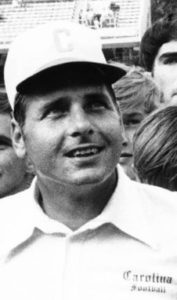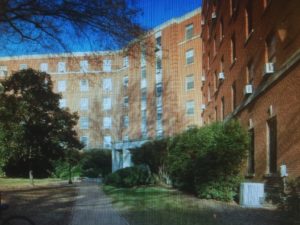It was late on an October afternoon went I sat down in North Carolina football coach Bill Dooley’s office to question him about a Tar Heel player who had died of a heat stroke.
Dooley’s office was in Kenan Field House at the east end of Kenan Memorial Stadium. I sat in a chair in front of the coach’s desk. He sat in a swivel chair on the other side. Behind him there was a large picture window overlooking the football field.
We were alone.

Dooley seemed angry. He knew I had already talked to several dozen people, including former players, about the way he ran his program and about what had happened the day the sophomore guard had collapsed while running wind sprints.
Dooley was being criticized by a group of former players who said he abused his players. The group was headed by a former All ACC linebacker who gave them credibility.
I had almost finished reporting the story — this would be the last interview — and I already knew enough to know the story would not be entirely unfavorable. But, of course, I didn’t tell him that.
We shook hands but there was no friendly banter. I sat down, turned on my tape recorder, and went to work. Dooley gave me short answers, but he answered. At least he didn’t hide behind a “spokesman” like a lot of officials do when their train jumps the tracks. I admired him for that.
Dooley said nothing critical about the All-ACC linebacker who was wearing him out at news conferences, although there was plenty the coach could have said.
This is what I eventually wrote about Dooley’s chief critic:
“[He] speaks for these ex-athletes, lends them his name. Yet, he has not told his news conferences of his own experience with the UNC coach. In a taped interview with The News & Observer, [he] said Dooley had arranged for him to see a psychiatrist during his sophomore year; that after he pleaded guilty in student court to stealing books, and was kicked out of school and lost his scholarship in January 1969, Dooley got him a job and a place to live and, when he was readmitted to school, Dooley recommended that his scholarship be reinstated.”
* * *
When I was done, when I had asked Dooley all the questions I had on my mind, he asked me to turn off my tape recorder. I did. He was off the record now, and he began to talk. I just sat there and listened.
The sun went down, but Dooley just kept talking. He didn’t turn on a light and, gradually, his office went dark. I couldn’t see him anymore, just an outline of him framed by the faint light from the window. He didn’t seem to notice the darkness.
It was plain to me — Dooley was devastated by the youngster’s death. He had lingered for 15 days at N.C. Memorial Hospital in Chapel Hill and the coach had spent countless hours at his bedside. And when he died part of Dooley died too.
Postscript: Dooley coached the Tar Heels for six more years before resigning in 1977 to take the head coaching job at Virginia Tech. Dooley’s record, 69-53-2, made him the winningest football coach in UNC history at that time.
Coming Monday: Her Sad Wish
